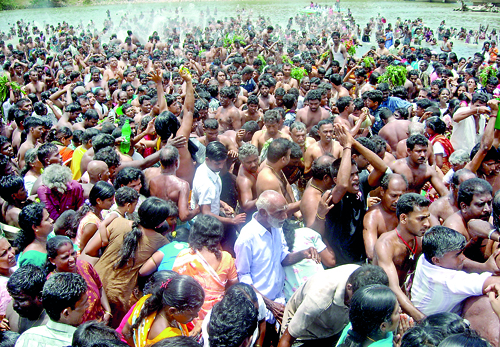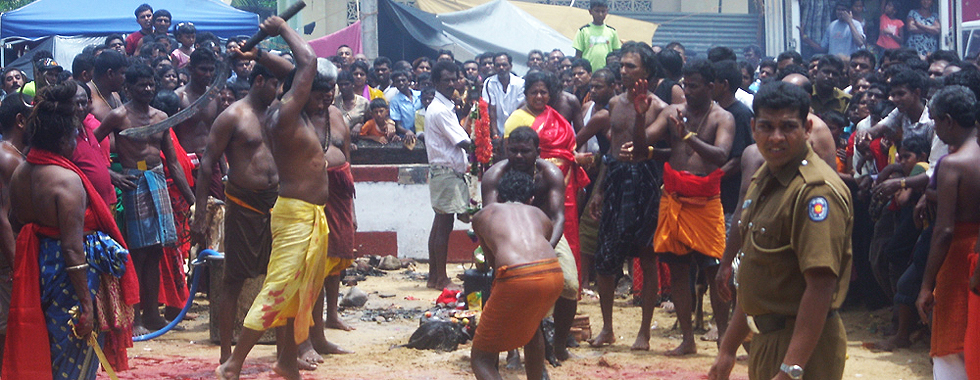News
Rights activists welcome SC decision on animal sacrifices
Animal rights activists have enthusiastically welcomed the recent Supreme Court decision to uphold the Court of Appeal judgment preventing ritual animal sacrifices at the Sri Bhadrakali Amman Kovil in Muneswaram, if it violated the Butchers’ Ordinance or the Cruelty to Animals Ordinance.
The judgment delivered earlier this week, issued by Chief Justice Mohan Pieris with Justices Priyasath Dep and Rohini Marasinghe, stated: “One has to bear in mind that the legislation in question namely the Butchers’ Ordinance and the Cruelty to Animals Ordinance that regulate the subject matter of animals are neutral and non-religion specific enactments which afford uniform treatment regardless of whoever slaughters animals or inflicts cruelty to animals and such intendment of the legislature cannot be advanced on the grounds of derogable exemptions afforded on the basis of religion.”

This year: The festival at Sri Bhadrakali Amman Kovil in Muneswaram in progression without animal sacrifice. Pix by Augustin Fernando
President’s Counsel Manohara de Silva, who argued the case in the Supreme Court on behalf of the animal rights activists, called the judgment “very progressive.”
“In any country, fundamental freedom of religion is subject to morality, ethics, democratic rights and so on; therefore to that extent it is a well-written, progressive judgment,” he told the Sunday Times.
Ritual animal sacrifices carried out at the Kovil were first exposed by The Sunday Times in 2009, when local correspondent Augustine Fernando took photographs of goats anfowl being slaughtered en masse on the Kovil grounds during its annual festival, usually held around August or September.
The explicit photographs depicting beheaded animals lying in pools of blood drew much public outcry, especially by animal rights activists who vehemently protested against the practice, which many of them termed “barbaric.”
“The fowl were torn away from their mothers, then are whirled high above before their heads are dashed on a stone,” said Sharmini Ratnayaka, secretary of the Animal Protection Trust, one of the organizstions involved in speaking out against the ritual sacrifices.
On one occasion time, one of the fowls slipped out of the hands of the person whirling it and one of our activists picked it up and ran away from the premises while onlookers swore at him,” she added. “It was a white, beautiful creature and it survived for a while. There are other animals

Previous occasion: Animal sacrifice taking place
being killed, like hens, who keep their eyes closed knowing very well what the humans are going to do to them.”
A year after the story was first exposed, during the Kovil’s 2010 annual festival, many activists, concerned citizens, and Hindu and Buddhist religious persons strongly condemned the practice. A peaceful protest organised at the time by rights activists along with the National Sangha Council was prevented by a court order obtained by area police.
In 2011, 14 petitioners, including animal rights activists Irangani de Silva, president of the Animal Welfare Trust, Lorraine Bibile, president of the Animal Protection Trust, Sagarica Rajakarunanayake, president of Sathwa Mitra, and Attorney-at-law Lalani Perera, filed a writ application in the Court of Appeal seeking to get the Police and local authorities to prohibit the ritual sacrifice on the grounds that it violated the Butchers’ Ordinance and the Cruelty to Animals Ordinance. The Court of Appeal issued a writ of mandamus ordering “to take all necessary action as permitted and empowered by law to prevent” animal sacrifices at the Kovil if it is done so without a licence obtained under the Butchers’ Ordinance or in violation of the provisions of the Butchers’ Ordinance or the Cruelty to Animals Ordinance.
“That means if they are going to sacrifice 500 animals, they have to get 500 permits,” Ms. Perera said. “They can’t just get blanket approval. They’ll also have to cite reasons, and also abide by other conditions of the Butchers’ Ordinance such as place of slaughter and health inspections.”
The case was taken to the Supreme Court by lawyers for the Kovil priests and trustees, on whether the Court of Appeal correctly interpreted the trade of butchery. Kovil Priest Mahendra Samy told the Sunday Times that the initial judgment and the subsequent upholding by the Supreme Court is “just like equating the Kovil to a mus kade [meat shop].”
Kovil Priest Samy insisted that the animal sacrifices are part of Hindu devotional practices in worshipping Mother Kali, and the animals are “freed” by sacrifice.
The Kovil’s defence of the sacrifice on religious grounds has been thoroughly contended by the All Ceylon Hindu Congress (ACHC) and other practicing Hindus. ACHC in 2010 issued a statement saying “….any cruelty to animals cannot be tolerated in the precincts of a Hindu temple.” An official at the Hindu Affairs Department said animal sacrifices are practiced by only a small segment of Hindu devotees who worship Kali, and is not tolerated by mainstream Hindus.
Anyway, witnesses to the sacrifices say the majority of the attendees are in fact Sinhalese, who come to the annual festival from other areas, seeking favours from Goddess Kali to pass exams, win court cases, reunite with estranged husbands, cure infertility or curse a neighbour.
Rights activists next want to make a “big impact” by completely banning ritual sacrifices, said Ms. Rajakarunanayake, a move supported by religious groups, including mainstream Hindus, and some Parliamentarians. A petition to appeal to the President to ban ritual sacrifices has also received some 750,000 signatures island-wide. However, despite claims by the Prime Minister in 2010 that the practice would be banned, authorities have yet to take any action.
Lawyer Ms. Perera said several activists met Buddha Sasana and Religious Affairs Ministry Secretary M.K.B. Dissanayaka on June 25 and presented him with a draft law, based on State laws in India, to ban animal sacrifices in the country. She said the activists were told that the matter would be presented to the “Presidential Advisory Committee on Religious Affairs.”
Secretary Dissanayaka told the Sunday Times he couldn’t “give an opinion on the matter right away” and added that any move to ban ritual sacrifices “should come from a higher place.”

